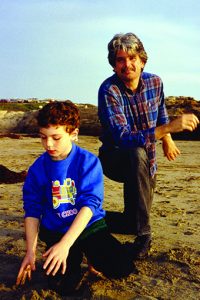- The Lessons of Uncertainty and Loss

An Excerpt from Seeking Jordan by Matthew McKay, PhD
The sound of truth, like some harmony that only the wise can hear, rings out in the spiritual salons and in the clerics’ quarters; it is heard from the high pulpits and after eating peyote.
But the sound of truth — the words and rhythms — is just a seduction. The emotion of certainty is just an emotion — no more true or false than any other. The mind says yes because the mind fears what it can’t predict or explain.
The mind seeks the exquisite relief of order and linearity. It seeks the Great One who can finally explain our pain, our waiting in the dark. The mind is always ready to say yes because it is wired into us, into our hunger to make sense of this place.
The idea of truth deceives us. The light holds a million versions of the truth — no one of them complete or whole. Each is the partial wisdom of one moment, looking across one vista. Each is a moment of great vision and a lie, because certainty seduces, and in that certainty every other vantage place is lost.
We seek certainty because it is the antidote to fear. We seek certainty because it’s the one thing impossible to find here.
But certainty is more dangerous than doubt. From conviction come razor-edged rules. Beliefs born of certainty harden and become swords of emotional violence. They cut and wound. They kill love because love — above all — accepts. It softens around each necessary flaw.
Certainty divides the world into what is true and false, rejected and embraced. It is the defense of the righteous, the self-willed. It is what war — in every form — is made of.
So this is certain: there is no certain truth here. And the certainty we think we find is often damaging; it is never the last word. It is never complete.
While doubt is painful, it is not a curse. Jordan has told me that doubt and uncertainty are necessary to our development as souls. They create a rocky field where things grow that can be found in no other place.
Sitting at my childhood desk once again, I meditate as I prepare to speak with Jordan. Behind the glass mask, a candle emits blue light. Outside, a susurrant breath of wind pushes through the redwoods. Finally, from some internal stillness, I ask Jordan why doubt and uncertainly are a necessary part of our life here. His answer comes in just a moment.
Jordan explains:
Certainty is not a healthy state for souls — incarnate or discarnate. There is an immense amount we don’t know. All learning must take place through the lens of doubt, which is why each thing we learn should be held as a mere hypothesis.
Doubt lies at the root of hope, and it is the experience of hope that makes seeking possible, that drives the quest for new knowledge and wisdom. So doubt motivates learning, the quest to enter what is unknown, the determination to turn darkness into light.
The doubt of incarnates, isolated as we are from our soul groups and guides, is especially painful. Nothing is certain; nothing is verifiable. We can’t even know with certainty whether the physical world is an illusion of consciousness. And while I can tell you that the physical universe exists in space and time, my words can’t prove that you aren’t dreaming. Where can we go for the truth? There is no one to ask except gurus, who are often lost themselves and may be making things up.
Here’s something important: the doubt of incarnates is crucial to the growth of all consciousness. That’s because seeking, in an environment where nothing can be proved or verified, creates openness to all the infinite possibilities. We are unencumbered by any absolute knowledge, so we can soar to imagine endless possibilities.
Paradoxically, discarnates are limited by vast, seemingly incontrovertible knowledge, which makes it more difficult for them to imagine the dark, unseen corners of the universe. We come to Earth (and other worlds) to know nothing and to imagine everything. With no certainty, with only intuition and the scientific method to guide us, we can reach past the observable bones of the universe to think what has never yet been thought and to ask what has never yet been a question. That is the gift of living in this uncertain place.
We have used our experience of not knowing to seek wisdom since souls began inhabiting bodies. We have sought truth through myths and allegories, through epic stories passed down from our elders, through beauty, and through endless observations of what works and what doesn’t. We have touched truth partially; we have at times sensed something enormous, just beyond the edges of thought. We have given all that we sensed and saw and imagined to collective consciousness — without any certainty of what was true or false.
That is what we do here.
Matthew McKay, PhD, is the author of Seeking Jordan and numerous other books. He is a clinical psychologist, professor at the Wright Institute in Berkeley, CA, and founder and publisher at New Harbinger Publications. Visit him online at www.SeekingJordan.com.
Excerpted from Seeking Jordan: How I Learned the Truth about Death and the Invisible Universe. Copyright ©2016 by Matthew McKay, PhD. Reprinted with permission from New World Library.
Continue reading →
